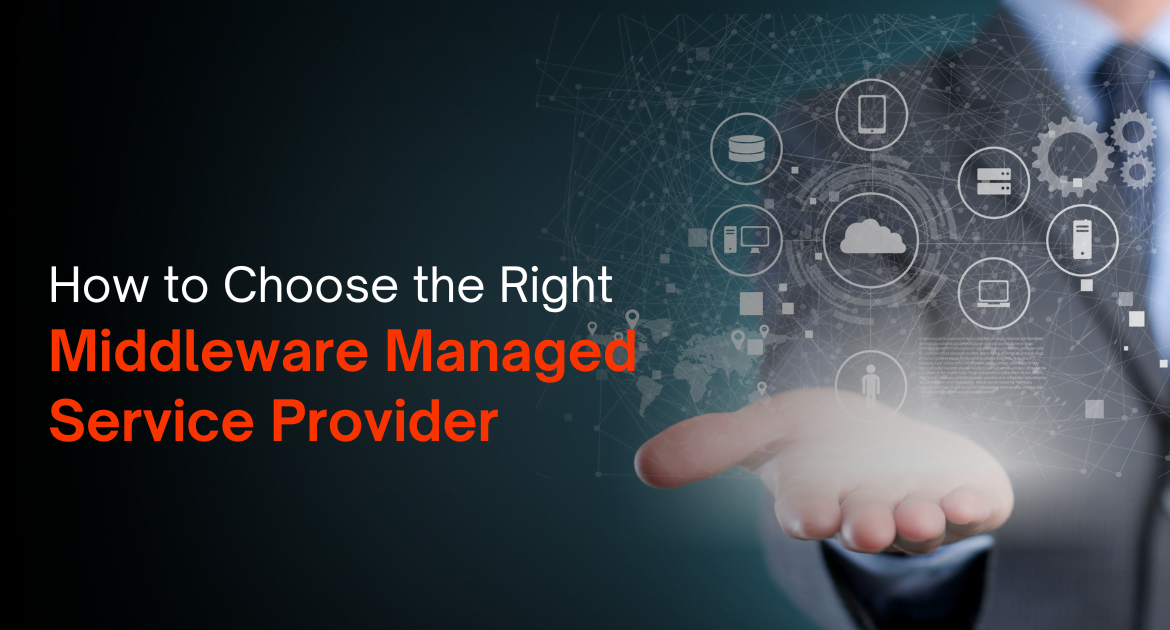In today’s fast-changing business technology landscape, choosing the right partners for your IT setup is more important than ever. One key decision is selecting a middleware managed service provider. Middleware—software that connects different applications and ensures smooth communication—is essential for modern business systems. With many options available, finding the best middleware provider can greatly impact your business’s efficiency, growth, and overall success.
How to Choose the Best Middleware Provider for Your Business
This guide will walk you through the key factors to consider when choosing a middleware provider. From understanding your specific business needs to evaluating provider abilities and ensuring strong support and security, we’ll cover everything you need to make an informed choice. Whether you’re a small business looking to grow or a large company seeking improvement, choosing the right middleware is crucial for your long-term success.
What is Middleware and Its Importance?
Before diving into the specifics of choosing middleware for IT, it’s essential to understand what is middleware is and why it is crucial for your business. Middleware is software that acts as a bridge between different applications, enabling them to communicate and share data effectively. It simplifies the complexities of integration, ensuring that different systems can work together smoothly.
Middleware plays a vital role in:
- Data Integration: It allows for the smooth exchange of data between different applications, ensuring consistency and accuracy.
- Process Automation: Middleware enables the automation of business processes by allowing applications to work together without manual intervention.
- Scalability: As your business grows, middleware can help scale your IT setup by easily integrating new applications and services.
- Security: It boosts security by providing a centralised platform for managing data exchanges and enforcing security rules.
Given its importance, choosing the right middleware managed service provider is a decision that requires careful thought.
How to Choose the Right Middleware Service Provider
When selecting the ideal middleware provider for your business, the first and most important step is to thoroughly assess your business needs. Middleware solutions act as a bridge between different applications and systems, enabling smooth integration and efficient data exchange. By understanding your specific requirements, you can make a well-informed decision and choose a middleware provider that aligns perfectly with your goals. Here’s a detailed guide to help you evaluate your needs and select the best middleware solution for your business.
 Understanding Your Business Goals
Understanding Your Business Goals
Identifying your business goals is the foundation of selecting the right middleware solution. Middleware can play a key role in achieving various objectives, such as improving operational efficiency, enhancing customer experience, or expanding service offerings. Start by asking yourself the following questions:
- What are my primary business goals? Are you aiming to streamline operations, improve data integration, or enhance customer interactions?
- How can middleware solutions support these goals? For instance, if operational efficiency is a priority, you may need middleware that facilitates smooth data flow and automates processes.
By clarifying your goals, you can better understand how middleware can be used to meet these objectives and choose a provider that offers features tailored to your needs.
Evaluating Existing IT Infrastructure
A critical aspect of selecting a middleware provider is assessing your current IT setup. Middleware solutions need to smoothly integrate with your existing systems and applications. Here’s what to consider:
- Current Applications: Review the applications you are using and their compatibility with potential middleware solutions. Middleware should support the data formats and protocols used by your applications.
- Integration Points: Identify key points where middleware will connect different systems. Ensure that the provider you choose offers strong integration capabilities for these points.
- Infrastructure Compatibility: Assess whether the middleware solution can integrate smoothly with your existing hardware and software. Compatibility issues can lead to costly disruptions and inefficiencies.
A thorough evaluation of your IT setup will help you select a middleware provider that fits well with your current setup and avoids compatibility problems.
Determining Budget Constraints
Budget constraints are an important factor when choosing middleware management services. While investing in a high-quality solution is crucial, it’s equally important to stay within your financial limits. Here’s how to approach budgeting for middleware:
- Upfront Costs: Consider the initial investment required for the middleware solution. This may include licensing fees, setup costs, and implementation expenses.
- Long-term Expenses: Evaluate ongoing costs such as subscription fees, maintenance, and support services. It’s important to factor in these recurring expenses to get a complete picture of the total cost of ownership.
- Pricing Models: Compare different pricing models offered by middleware providers. Some may offer fixed pricing, while others may use a subscription or usage-based model. Choose a model that aligns with your budget and usage patterns.
Balancing quality and cost will help you find a middleware solution that delivers value while staying within your financial limits.
Considering Scalability Requirements
As your business grows, your middleware solution should be able to scale accordingly. Scalability is a key factor to ensure that the solution can handle increasing data volumes, user loads, and evolving business needs. Here’s what to look for:
- Flexible Solutions: Choose a middleware provider that offers scalable and flexible solutions. This will allow you to adjust resources and capabilities as your business needs change.
- Future Growth: Consider your long-term growth plans and whether the middleware solution can adapt to these changes. A provider with a history of supporting businesses through various growth stages can be a valuable partner.
- Upgrade Paths: Ensure that the middleware solution has clear upgrade paths and options for expansion. This will help you avoid the hassle of switching providers as your business scales.
A scalable middleware solution will save you from future disruptions and ensure that your systems continue to operate efficiently as your business grows.[/fancy-ul][fancy-ul icon_type=”font_icon” icon=”fa fa-paper-plane” color=”Accent-Color” alignment=”left” spacing=”5px” link_style=”default”]
Choosing a Middleware Provider
Now that you know what to look for in a middleware managed service provider, it’s time to evaluate your options. Here’s a step-by-step approach to help you make an informed decision:
- Shortlist Potential Providers : Based on your assessment of business needs and key factors, create a shortlist of potential middleware vendors. Use online reviews, industry reports, and recommendations from peers to identify reputable providers.
- Request Proposals: Reach out to the shortlisted providers and request detailed proposals. The proposals should include information on their services, technology stack, customization options, support, security measures, and pricing.
- Conduct Interviews: Schedule interviews with the providers to discuss your requirements in detail. Use this opportunity to ask questions, clarify doubts, and assess their responsiveness and willingness to understand your business needs.
- Evaluate Proposals: Carefully evaluate the proposals based on the criteria discussed earlier. Compare the offerings, expertise, pricing, and other factors to determine which provider best meets your needs.
- Check References: Ask the providers for references from their existing clients. Contact these references to gain insights into their experiences with the provider. This step will help you validate the provider’s claims and make an informed decision.
- Conduct a Pilot: If possible, conduct a pilot project with the selected provider. A pilot will allow you to test the middleware solution in a real-world scenario and evaluate its performance, reliability, and compatibility with your systems.

Key Factors to Consider When Choosing a Middleware Service Provider?
Once you have a clear understanding of your business needs, you can start evaluating potential middleware providers. Here are the key factors to consider:
- Expertise and Experience
Look for a provider with a strong track record in delivering middleware solutions. Experience in your industry can be especially valuable as it shows they understand the unique challenges of your sector. Check their portfolio, case studies, and client testimonials to assess their expertise. - Range of Services
A wide range of services is important. Make sure the provider offers various middleware solutions, including integration, orchestration, messaging, and API management. This variety ensures you can depend on one provider for all your middleware needs. - Technology Stack
Review the technology stack used by the provider. Ensure it fits with your current and future IT setup. The middleware should support different protocols, data formats, and integration points. Compatibility with major platforms like AWS, Azure, and Google Cloud is also important. - Customization and Flexibility
Your business has unique needs, so look for providers that offer customizable and flexible solutions. This ensures the middleware can be tailored to fit your specific requirements. - Support and Maintenance
Reliable support and maintenance are crucial. Ensure the provider offers 24/7 support and has a strong incident management process. Regular updates and security patches are also essential. - Security and Compliance
Security is critical when dealing with data integration and communication. Check that the provider follows best practices for security, including encryption and access controls. Also, make sure they comply with relevant regulations like GDPR, HIPAA, and PCI-DSS. - Performance and Reliability
High performance and reliability are key for middleware solutions. Check the provider’s uptime guarantees, latency metrics, and disaster recovery plans. A reliable provider will ensure minimal downtime and quick recovery if issues arise.
Mistakes to Avoid while selecting a Middleware Service Provider
- Neglecting Compatibility
Ensure that the middleware solution fits seamlessly with your current IT setup. Incompatibilities can lead to significant issues such as data errors, application malfunctions, or operational delays. Verify that the middleware integrates smoothly with your existing software, databases, and hardware to avoid complications. - Overlooking Scalability
Choose a provider whose middleware solutions can grow with your business. A solution that isn’t scalable may become a problem as your company expands, causing performance slowdowns or requiring costly upgrades. Look for flexible solutions that can handle increased demands and user growth. - Underestimating Security
Make security a top priority by selecting a middleware solution with strong protective measures and adherence to industry regulations. Ignoring security can lead to vulnerabilities, data breaches, and compliance issues. Ensure the provider uses effective encryption, access controls, and regular security updates. - Focusing Only on Price
While managing costs is important, don’t choose solely based on the lowest price. Opting for the cheapest provider might compromise essential elements such as service quality, reliability, and ongoing support. Assess the overall value by considering performance, long-term benefits, and support services. - Skipping Thorough Evaluation
Conduct a thorough assessment of potential providers. This involves reviewing detailed proposals, interviewing candidates, and checking client references. Running a trial or pilot project can provide valuable insights into how well the solution works in your environment and meets your needs. - Ignoring Vendor Support
Evaluate the level of support offered by the middleware vendor. Insufficient support can result in prolonged downtime and unresolved issues. Ensure the vendor provides comprehensive support services, including technical assistance, regular maintenance, and timely updates to keep the solution running smoothly. - Disregarding Emerging Trends
Stay updated on advancements in middleware technology. Providers who keep up with new developments can offer innovative features and functionalities. For example, integration with AI and machine learning can improve automation and performance, keeping your middleware solution current. - Underestimating Integration Challenges
Consider the complexity involved in integrating the middleware with your existing systems. Difficult integrations can lead to extra costs, delays, and operational disruptions. Look for solutions that offer strong integration capabilities and compatibility with various protocols and data formats for a smoother implementation.
By avoiding these common mistakes, you can make a well-informed choice and select a middleware managed service provider that aligns with your business goals and supports your long-term success.
Future Trends in Middleware Managed Services
As technology continues to evolve, the middleware landscape is also undergoing significant changes. Here are some future trends to watch for in middleware management services:
- Cloud-Native Middleware: The adoption of cloud-native middleware solutions is on the rise. These solutions are designed to run in cloud environments and offer scalability, flexibility, and cost-efficiency. Cloud middleware solutions can seamlessly integrate with cloud applications and services, making them a popular choice for businesses moving to the cloud.
- AI and Machine Learning Integration: Middleware solutions are increasingly incorporating AI and machine learning capabilities. These technologies can enhance data integration, process automation, and decision-making. AI-powered middleware can analyse data in real-time, detect anomalies, and optimise workflows.
- API-First Approach: An API-first approach is becoming a standard practice in middleware solutions. APIs enable seamless integration between applications and services, allowing for more flexibility and scalability. Middleware providers are focusing on developing robust API management solutions to support this approach.
- IoT Integration: The Internet of Things (IoT) is driving the need for middleware solutions that can integrate and manage IoT devices and data. Providers are developing solutions that can handle the unique challenges of IoT integration, such as data volume, security, and real-time processing.
- Edge Computing: Edge computing is gaining traction as businesses seek to process data closer to the source. Middleware solutions are evolving to support edge computing environments, enabling real-time data processing and integration at the edge. This trend is particularly relevant for industries like manufacturing, healthcare, and transportation.
Wrapping Up –
Finding the perfect middleware managed service provider is more than just a smart move—it’s a game-changer for your business’s efficiency and growth. At SimpleLogic IT, we understand the critical role middleware plays in streamlining operations, integrating data seamlessly, and boosting overall performance.
Choosing the right provider can make all the difference. By diving deep into your needs and carefully evaluating potential partners, you’ll ensure that your middleware solution not only meets but exceeds your expectations. SimpleLogic IT is here to guide you through every step of this process, offering expertise and solutions tailored to your unique requirements.
We stay ahead of the curve, keeping you informed about future trends to ensure your business remains agile and competitive. Investing in a reliable partner like SimpleLogic IT means positioning your business for sustained growth and success. Explore how we can transform your operations at SimpleLogic IT and make a decision that will drive your business forward.
FAQs About Middleware Managed Service Provider
1. What is middleware and why is it important?
Middleware connects different applications, ensuring smooth communication and data exchange.
2. How does middleware improve data integration?
It enables seamless data exchange and automates processes.
3. What should I consider when choosing a middleware provider?
Consider expertise, services, technology stack, customization, support, security, performance, and pricing.
4. Why is it important to evaluate my existing IT infrastructure?
To ensure the middleware integrates smoothly with your current systems.
5. What expertise should I look for in a middleware provider?
Look for a strong track record and industry-specific experience.




